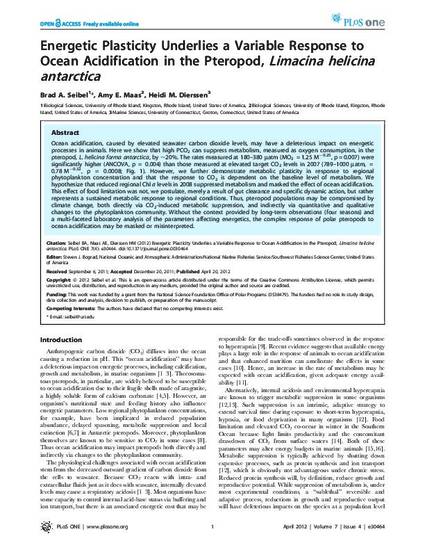
Ocean acidification, caused by elevated seawater carbon dioxide levels, may have a deleterious impact on energetic processes in animals. Here we show that high PCO2 can suppress metabolism, measured as oxygen consumption, in the pteropod, L. helicina forma antarctica, by ∼20%. The rates measured at 180–380 µatm (MO2 = 1.25 M−0.25, p = 0.007) were significantly higher (ANCOVA, p = 0.004) than those measured at elevated target CO2 levels in 2007 (789–1000 µatm, = 0.78 M−0.32, p = 0.0008; Fig. 1). However, we further demonstrate metabolic plasticity in response to regional phytoplankton concentration and that the response to CO2 is dependent on the baseline level of metabolism. We hypothesize that reduced regional Chl a levels in 2008 suppressed metabolism and masked the effect of ocean acidification. This effect of food limitation was not, we postulate, merely a result of gut clearance and specific dynamic action, but rather represents a sustained metabolic response to regional conditions. Thus, pteropod populations may be compromised by climate change, both directly via CO2-induced metabolic suppression, and indirectly via quantitative and qualitative changes to the phytoplankton community. Without the context provided by long-term observations (four seasons) and a multi-faceted laboratory analysis of the parameters affecting energetics, the complex response of polar pteropods to ocean acidification may be masked or misinterpreted.
PLoS ONE, v. 7, issue 4, art. journal.pone.0030464
© 2012 Seibel et al. This is an open-access article distributed under the terms of the Creative Commons Attribution License, which permits unrestricted use, distribution, and reproduction in any medium, provided the original author and source are credited.
Available at: http://works.bepress.com/brad-seibel/32/
